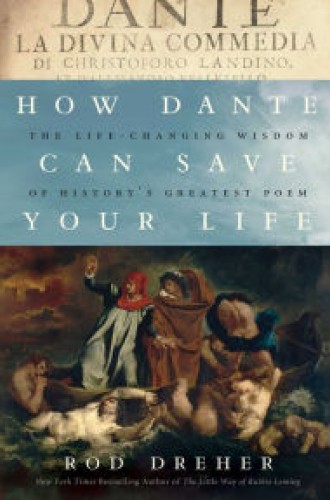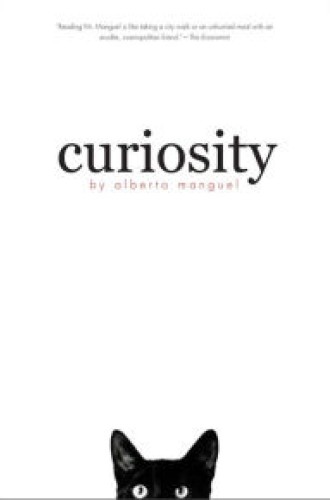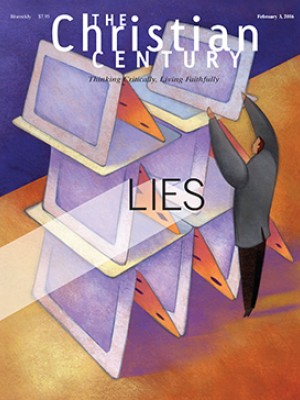Into the dark with Dante
Midway along the journey of our life
I woke to find myself in a dark wood,
for I had wandered off from the straight path.With these words Dante opens his immortal epic the Divine Comedy, in which the poet-pilgrim’s journey through hell, purgatory, and paradise represents every soul’s quest for salvation. In an age that has largely discarded the myth of the three-story afterlife, why does the Commedia—Divina was added by a later publisher—retain its universal standing and appeal? I believe that the clue is in the opening tercet, for its images speak to the uncertainties of every generation, to those who have awakened, as from a dream, to discover that their lives and grand aspirations are half spent and that they are lost in an impenetrable darkness from which they cannot extricate themselves.
When we are in such a bind, our first impulse is to grab a map. But our maps of assured results and quantifiable outcomes, to say nothing of success, happiness, and love, have proved inaccurate or out of date. The mapmakers are as lost as we are. Then again, if you were lost in a dark wood of addiction, illness, or despair, which would you rather have: a map that may or may not be accurate, or a single faithful guide who knows the terrain, having walked it before? Dante’s advice: Forget the map. Take the guide.
Read our latest issue or browse back issues.
Protestant Christians will instinctively resist intermediaries and choose Jesus as their guide. But Dante’s Christ dwells in the Empyrean, far above the worlds of Italian intrigues and American politics. He offers the poet Virgil instead, the classic ideal of reason, to guide the Pilgrim through the multiple pits of hell and into purgatory. Virgil lives in Limbo, the home of greats like Homer, Aristotle, and Cicero, who did not know Christ and therefore are deprived of heaven. Virgil’s pre-Christian status, however, does not diminish the value of his counsel, for his art “may be said to be God’s grandchild.”
Virgil is wise enough to know that the road to heaven must pass through a confrontation with human evil (and its gory punishments) in “the starless air of Hell” and must continue with cleansing on the Mount of Purgatory. Virgil has gone as far as he can go. Enter Beatrice, the allegory of revelation and the embodiment of divine love. Her shade soars above the courtly love tradition with which Dante himself was smitten. Just as Dante the poet transforms himself into the representative Pilgrim, he causes Beatrice to transcend her brief life on earth and become the eternal principle of purity, second only to the Virgin Mary. She will lead the Pilgrim to the highest terrace of Purgatory, the Garden of Eden, where together, “eager to rise, now / ready for the stars,” they will ascend through the heavenly spheres to the Ineffable itself.
What are we to do with Dante? One answer comes from Rod Dreher, writer, journalist, and senior editor at the American Conservative. How Dante Can Save Your Life is his enthusiastic recommendation of the Commedia as a spiritual guide to overcoming life’s problems and attaining spiritual blessedness. His book is a “reading memoir” in which the author’s life story is paired with and located within a great book. One thinks of Azar Nafisi’s Reading Lolita in Tehran.
Dreher grew up in rural Louisiana under the unappeasable authority of his father, Ray Dreher, a man’s man whose love of football, deer hunting, and all things country completely bypassed his bookish son. In a pivotal incident early in the narrative, Rod goes hunting with his dad and, unhappily, kills a baby squirrel. When his father finds him weeping over the squirrel, he pronounces his son a sissy and effectively disowns him. That his sister Ruthie effortlessly absorbs their father’s values leads to an estrangement between brother and sister, to the extent that even her children have no regard for their uncle.
Incidents of slight and insult pile up in this family chronicle; the family dynamic is clear. What is not so clear is the motive behind it all. Why can’t country people respect a young man’s literary gifts? How is it that Rod’s acceptance of a job in Washington, D.C., can unleash a tsunami of resentment on the part of his father and his sister? The reader wants to know more.
Dreher moved on from Washington to a succession of newspaper jobs in New York, Dallas, and Philadelphia as he built a successful career in journalism. But increasingly plagued by depression, physical ailments, and spiritual ennui, he continued to be haunted by home. Eventually he decided to move his family back to his roots, to live among his kindred near Starhill, Louisiana. Once there, he and his wife repeatedly tried, without success, to satisfy his craving for their acceptance. The sexual abuse scandal in the Catholic Church led Dreher and his family to convert from Catholicism to Eastern Orthodoxy. Throughout the book he compares his own critique of the church’s hierarchy with Dante’s hatred of clergy and papal worldliness.
Dreher’s struggles with his family and with poor health are the hermeneutic lens through which he reads the Commedia. At each step and misstep along the way Dreher draws a one-to-one analogy between incidents in the Divine Comedy and the concerns of his own life. In a section called “Dante’s Exile—and My Own,” Dante’s enforced exile from his beloved Florence calls to mind the author’s exile from his family home in Starhill. Just as Dante reveres father figures such as Virgil, the contemporary author worries that he has made a god of his difficult father. Just as the lost souls in hell are less than honest about their earthly sins, so Dreher confesses, “the story I told myself about myself and the people in my life might not be true.” Thus each of Dante’s observations offers a practical lesson illuminating the author’s own pilgrimage. Following each chapter the author provides a how-to-do-it box summarizing the relevant lesson: “How to Refuse Defeat,” “How to Let Go of Your Ego,” and so on.
If the book is read primarily as a memoir, its exclusive reference to one man’s story will make sense and be helpful. We all need help. Why not learn from the classic that is famous for its insights into the human condition? Yet—and I believe the author would agree—there is more to the epic than the first word of Dreher’s title: How. There is something about the majesty of the Divine Comedy that should not be reduced to a self-help book—or even the appearance of a self-help book.
Greater than Dante’s portrait of an individual soul is the Commedia’s testimony to the justice of God. The poem’s perfect symmetry, evident in divisions and cantos of threes, the repeating triplex of rhyme, its ordered topography of the afterlife, and most of all, the justice meted out to sinners in symmetry with the nature of their sins—all of it witnesses to a righteous God. “The Providence that regulates the whole” does not always cater to our insecurities, solve our personal problems, or reflect our notions of right and wrong. The Pilgrim, who initially sympathizes with sinners in Inferno, later hardens his heart toward them in recognition of the necessity of God’s judgment. Finally, at the very end of the journey, the shades of the just rejoice around the heavenly white rose. But God, who is not a shade, is veiled in light. There is no dying in the Commedia, for everyone is dead except God.
If Dreher’s study of Dante is a book of answers, Alberto Manguel’s Curiosity is a book of questions. Aside from their veneration of Dante, the two authors have little in common. Whereas Dreher applies the Commedia to a personal problem, Manguel universalizes it and lets it loose in the world. He frames each chapter with two questions, one from his own life, the other a universal dilemma. His chapters are questions: Where is our place? What are the consequences of our actions? What comes next? His dialectical approach is reminiscent of Dante’s theological mentor, Thomas Aquinas.
With a spark provided by Dante, Manguel’s questions lead to further interrogations of history and literature. For example, the horrors observed by the Pilgrim in the Wood of Suicides in Canto XIII of Inferno lead Manguel to conversations with Augustine, Samuel Beckett, and Shakespeare, and into wider considerations of contemporary violence. His interpretation of the poem’s characters—and Dante himself—as immigrants evokes the hell of a refugee camp and the long train of migrants crossing not from purgatory to heaven, but from Syria to Germany. The Pilgrim’s great-grandfather prophesies Dante’s fate and that of all refugees:
You shall be forced to leave behind those things
you love most dearly, and this is the first
arrow the bow of your exile will shoot.And you will know how salty is the taste
of others’ bread, how hard the road that takes
you down and up the stairs of others’ homes.You might have imagined by now that it is easier to enjoy Dante than to review books on Dante! I suggest that you choose one of the many English translations of the Divine Comedy—I have found Mark Musa’s translation in The Portable Dante most helpful—and devote yourself to a long winter’s read. Then draw from it your own conclusions—or questions. It may save your life.
This review appears in the February 3, 2016 issue.








